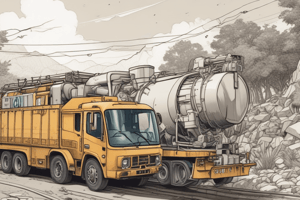Podcast
Questions and Answers
What is the primary issue with the current global economy regarding resource use?
What is the primary issue with the current global economy regarding resource use?
- It encourages product repair.
- It maximizes recycling efficiency.
- It supports a circular economy model.
- It is predominantly linear. (correct)
Which of the following is a challenge associated with recycling?
Which of the following is a challenge associated with recycling?
- It often results in a loss of material quality. (correct)
- Most recyclable materials can be easily recycled.
- The process is always efficient.
- It requires no energy to process materials.
How can marketing campaigns promoting recycling impact consumer behavior?
How can marketing campaigns promoting recycling impact consumer behavior?
- They reduce overall consumption rates.
- They can lead to increased waste generation. (correct)
- They encourage local recycling initiatives.
- They promote buying more eco-friendly products.
What is a key aspect of the circular economy?
What is a key aspect of the circular economy?
Why is recycling not considered a complete solution to climate change?
Why is recycling not considered a complete solution to climate change?
What percentage of plastic is recycled globally out of 100kg?
What percentage of plastic is recycled globally out of 100kg?
What effect can excessive reliance on recycling have on consumer behavior?
What effect can excessive reliance on recycling have on consumer behavior?
Which environmental issue is most closely related to illegal waste disposal practices?
Which environmental issue is most closely related to illegal waste disposal practices?
What type of policies can governments implement to support the transition to a circular economy?
What type of policies can governments implement to support the transition to a circular economy?
What is a misconception about recycling?
What is a misconception about recycling?
Flashcards are hidden until you start studying
Study Notes
Recycling and Climate Change
- Recycling is a common practice, with many believing it is the most effective way to reduce emissions.
- The recycling process is often seen as a loop, turning old materials into new products.
- The global economy is largely linear, meaning resources are extracted, used, and then discarded.
- This linear model leads to significant environmental impact, including greenhouse gas emissions and biodiversity loss.
The Challenges of Recycling
- Recycling materials often lose quality, requiring additional resources and energy.
- The energy used to recycle can create emissions, potentially negating the benefits of recycling.
- The recycling process can be inefficient, with only 8kg of plastic out of 100kg being recycled globally.
- Some recyclable materials are not technically recyclable, or are not financially viable to recycle.
- Shipping waste for recycling can also create substantial emissions.
- Illegal waste disposal, including burning, contributes further pollution.
Consumer Behavior and Recycling
- Marketing campaigns promoting recycling can lead to consumers feeling good about themselves, even if they are still consuming more.
- The belief that recycling is a solution can encourage people to consume more and dispose of more.
The Circular Economy
- Keeping products in use for longer is a key aspect of the circular economy.
- Repairing and reusing products can contribute to reducing consumption and waste.
- Governments can help shift towards a circular economy through policies like plastic bag bans.
- The focus should be on selling light, services, and experiences rather than products.
The Limitations of Recycling
- Recycling cannot solve the climate crisis on its own.
- Combatting climate change requires making bigger lifestyle choices, such as buying less, flying less, and shifting to sustainable transportation.
- While recycling is important, it is not a magic bullet solution.
Recycling and Climate Change
- Recycling is often thought of as an effective way to reduce emissions, but its impact is limited.
- The global economy operates on a linear model, using resources, then discarding them.
- This linear model contributes to environmental damage, including greenhouse gas emissions and biodiversity loss.
The Challenges of Recycling
- Recycling materials can lose quality, requiring more resources and energy.
- The energy used for recycling can create emissions, potentially counteracting the benefits.
- Only a small percentage of plastic is actually recycled globally (8% out of 100kg).
- Some materials are not technically recyclable or economically viable to recycle.
- Transporting waste for recycling can generate significant emissions.
- The illegal disposal of waste, including burning, causes further pollution.
Consumer Behavior and Recycling
- Marketing campaigns promoting recycling can make consumers feel good, even if their consumption remains high.
- The belief that recycling is a solution might encourage people to consume and dispose of more.
The Circular Economy
- Keeping products in use for longer is essential for a circular economy.
- Repairing and reusing products reduce consumption and waste.
- Government policies, like plastic bag bans, can promote a circular economy.
- The focus should shift towards selling services, experiences, and sustainable products.
The Limitations of Recycling
- Recycling alone cannot solve the climate crisis.
- We need to make larger lifestyle changes, such as consuming less, flying less, and choosing sustainable transportation.
- Recycling is important, but it is not a magic bullet solution.
Studying That Suits You
Use AI to generate personalized quizzes and flashcards to suit your learning preferences.




